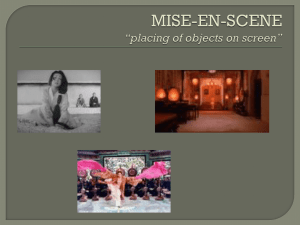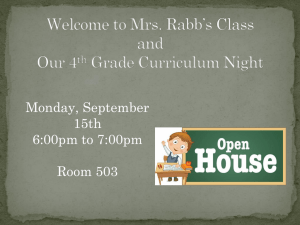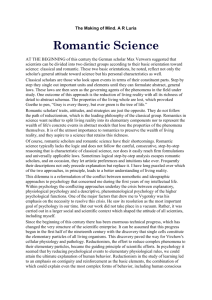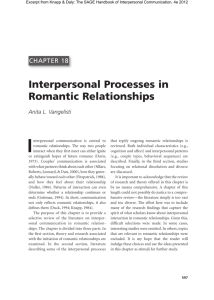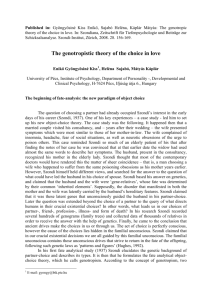Introduction to Intimate Relationships, Spring 2006
advertisement
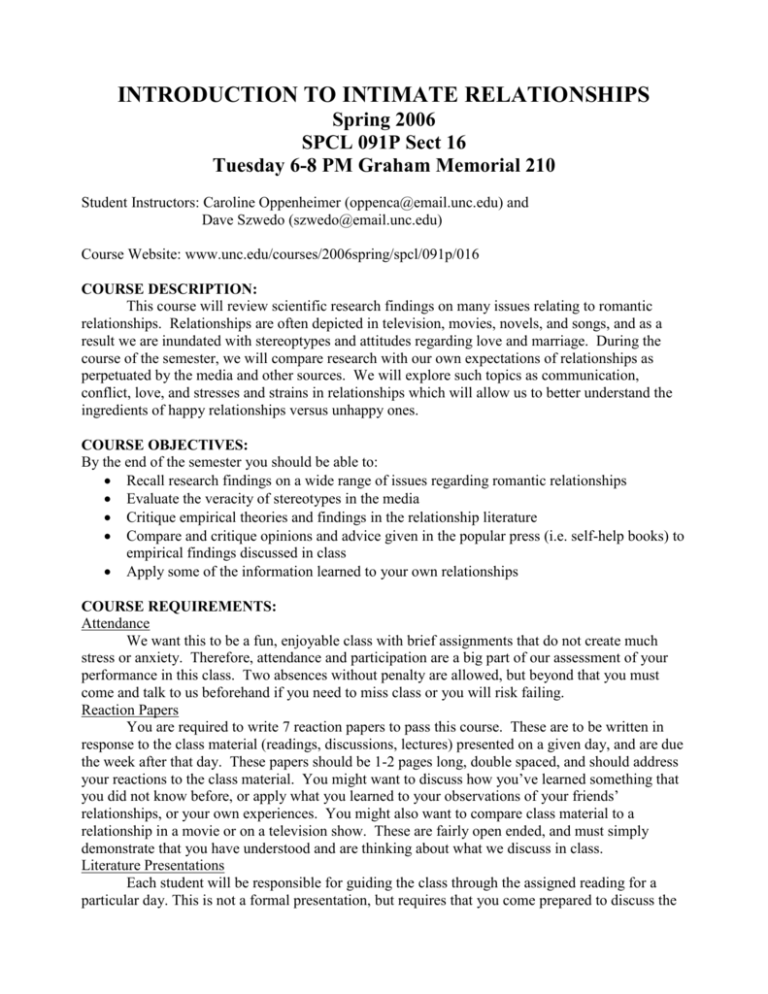
INTRODUCTION TO INTIMATE RELATIONSHIPS Spring 2006 SPCL 091P Sect 16 Tuesday 6-8 PM Graham Memorial 210 Student Instructors: Caroline Oppenheimer (oppenca@email.unc.edu) and Dave Szwedo (szwedo@email.unc.edu) Course Website: www.unc.edu/courses/2006spring/spcl/091p/016 COURSE DESCRIPTION: This course will review scientific research findings on many issues relating to romantic relationships. Relationships are often depicted in television, movies, novels, and songs, and as a result we are inundated with stereoptypes and attitudes regarding love and marriage. During the course of the semester, we will compare research with our own expectations of relationships as perpetuated by the media and other sources. We will explore such topics as communication, conflict, love, and stresses and strains in relationships which will allow us to better understand the ingredients of happy relationships versus unhappy ones. COURSE OBJECTIVES: By the end of the semester you should be able to: Recall research findings on a wide range of issues regarding romantic relationships Evaluate the veracity of stereotypes in the media Critique empirical theories and findings in the relationship literature Compare and critique opinions and advice given in the popular press (i.e. self-help books) to empirical findings discussed in class Apply some of the information learned to your own relationships COURSE REQUIREMENTS: Attendance We want this to be a fun, enjoyable class with brief assignments that do not create much stress or anxiety. Therefore, attendance and participation are a big part of our assessment of your performance in this class. Two absences without penalty are allowed, but beyond that you must come and talk to us beforehand if you need to miss class or you will risk failing. Reaction Papers You are required to write 7 reaction papers to pass this course. These are to be written in response to the class material (readings, discussions, lectures) presented on a given day, and are due the week after that day. These papers should be 1-2 pages long, double spaced, and should address your reactions to the class material. You might want to discuss how you’ve learned something that you did not know before, or apply what you learned to your observations of your friends’ relationships, or your own experiences. You might also want to compare class material to a relationship in a movie or on a television show. These are fairly open ended, and must simply demonstrate that you have understood and are thinking about what we discuss in class. Literature Presentations Each student will be responsible for guiding the class through the assigned reading for a particular day. This is not a formal presentation, but requires that you come prepared to discuss the material and direct the rest of the group through its main points and questions. On the day you present, please come to class with a brief outline of the article and two or three questions designed to generate discussion in class. The readings are posted on the course website. Final Paper For your final paper you will be required to find a self-help book of your choice that gives specific advice on how to behave in a romantic relationship. You will write a 3-5 page paper, double spaced, on whether you agree or disagree with this advice. You must use research discussed in class to support your argument. COURSE SCHEDULE: January 17th – Introduction What are our expectations for love and marriage? How is our expectation for marriage different from other cultures and periods in history? What are the benefits of marriage and committed relationships? What are the outcomes of marital discord? Suggested reading: Scheinkman, M. (2005). Beyond the trauma of betrayal: Reconsidering affairs in couples therapy. Family Process, 44, 227-244. Film clip: Pretty Woman January 24th – Attraction What do we consider physically attractive and why? Why are certain types of people attracted to one another? What are other reasons for attraction besides personality and physical appearance? Readings: Bressler, E.R., & Balshine, S. (2005). The influence of humor on desirability. Evolution and Human Behavior (in press). Schmitt, D.P., & Shackelford, T.K. (2003). Nifty ways to leave your lover: The tactics people use to entice and disguise process of human mate poaching. Personality and Social Psychology Bulletin, 29, 1018-1035. January 31st – Social Cognition How important are first impressions? Do expectations guide behavior? Just how well can we expect to know our partners? Reading: Kurzban, R., & Weeden, J. (2005). Hurrydate: Mate preferences in action. Evolution and Human Behavior, 26, 227-244. Film clip: There’s Something About Mary February 7th – Communication How does communication differ between happy and unhappy couples? What are examples of nonverbal communication? Are there gender differences in communication? Film clip: Adult-Adult Interaction Readings: Gladwell, M. (2005). Blink. Pgs. 18-34. Cox, M., Heilbron, N., Pressel, A., & Schudlich, T. (2005). Marital Observational Coding Manual. February 14th – Love Has love always been associated with marriage? What is the triangular theory of love? Does love last? What are some explanations of love? Reading: Sprecher, S. (1999). “I love you more today than yesterday”: Romantic partners’ perceptions of changes in love and related affect over time. Journal of Personality and Social Psychology, 76, 46-53. February 21st – Attachment What are attachments and how are they formed? How long do they last? Can we change them? What are the implications for romantic relationships? Reading: Paley, B., Cox, M.J., Burchinal, M.R., & Payne, C.C. (1999). Attachment and marital functioning: Comparison of spouses with continuous-secure, earned-secure, dismissing, and preoccupied attachment stances. Journal of Family Psychology, 13, 580-597. Film clip: Ainsworth’s Strange Situation February 28th – Interdependency How are relationships like economies? What is exchanged? What determines if we’ll stay in our current relationships? Why do some relationships fall apart quickly? How can we remain satisfied in our relationships? Reading: Drigotas, S.M., Safstrom, C.A., & Gentilia, T. (1999). An investment model prediction of dating infidelity. Journal of Personality and Social Psychology, 77, 509-524 Film clip: The 5th Element March 7th – Sexuality Why do people have sex? Why don’t they? What is “sociosexuality” and how does it relate to infidelity? What determines sexual satisfaction? How do we communicate desire? Reading: Baumeister, R.F., & Vohs, K.D. (2004). Sexual economics: Sex as a female resource for social exchange in heterosexual interactions. Personality and Social Psychology Review, 8, 339363. Film clip: Kinsey March 21st – Conflict and Violence Is conflict good or bad for relationships? What are common topics and triggers of conflict? How do unhappy couples handle conflict compared to happy ones? What are the different types of violence in relationships? Reading: Amato, P.R., & Booth, A. (2001). The Legacy of parents’ marital discord: Consequences children’s marital quality. Journal of Personality and Social Psychology, 81, 627-638. for Film clip: Newlyweds March 28th – Stresses and Strains What prevents some relationships from ever beginning? Is jealousy a good test of love? Can we lie to our partners and get away with it? Reading: Fleischmann, A.A., Spitzberg, B.H., Andersen, P.A., & Roesch, S.C. (2005). Tickling the monster: Jealousy induction in relationships. Journal of Social and Personal Relationships, 22, 49-73. Film clip: Unfaithful April 4th – Power in Intimate Relationships What is the principle of least interest? Is it true? How is power communicated? Why do we have a need for power? Reading: Felmlee, D.H. (1994). Who’s on top? Power in romantic relationships. Sex Roles, 31, 275-295. Film clip: Legally blonde April 11th – Dissolution and Loss of Relationships Why has the divorce rate increased? What are the predictors of divorce? How does the dissolution of a relationship affect individuals? How does divorce affect children? Reading: Jeffry, A.S. (1987). The dissolution of romantic relationships: Factors involved in relationship stability and emotional distress. Journal of Personality and Social Psychology, 53, 683-692. April 18th - Fostering Relationships: Getting, Maintaining, and Repairing Them What are some strategies for maintaining relationship satisfaction over time? What are the ways in which people can repair relationships? What are the different approaches to couples therapy? Are interventions effective? Reading: Jacobson, N.S., & Addis, M.E. (1993). Research on couples and couple therapy: What do we know? Where are we going? Journal of Consulting and Clinical Psychology, 61, 85-93. April 25th – Inverventions and Wrap Up Evaluation of class Discuss final questions and concerns Couples therapy demonstration Guest Speaker: Nicole Heilbron Final Paper Due

